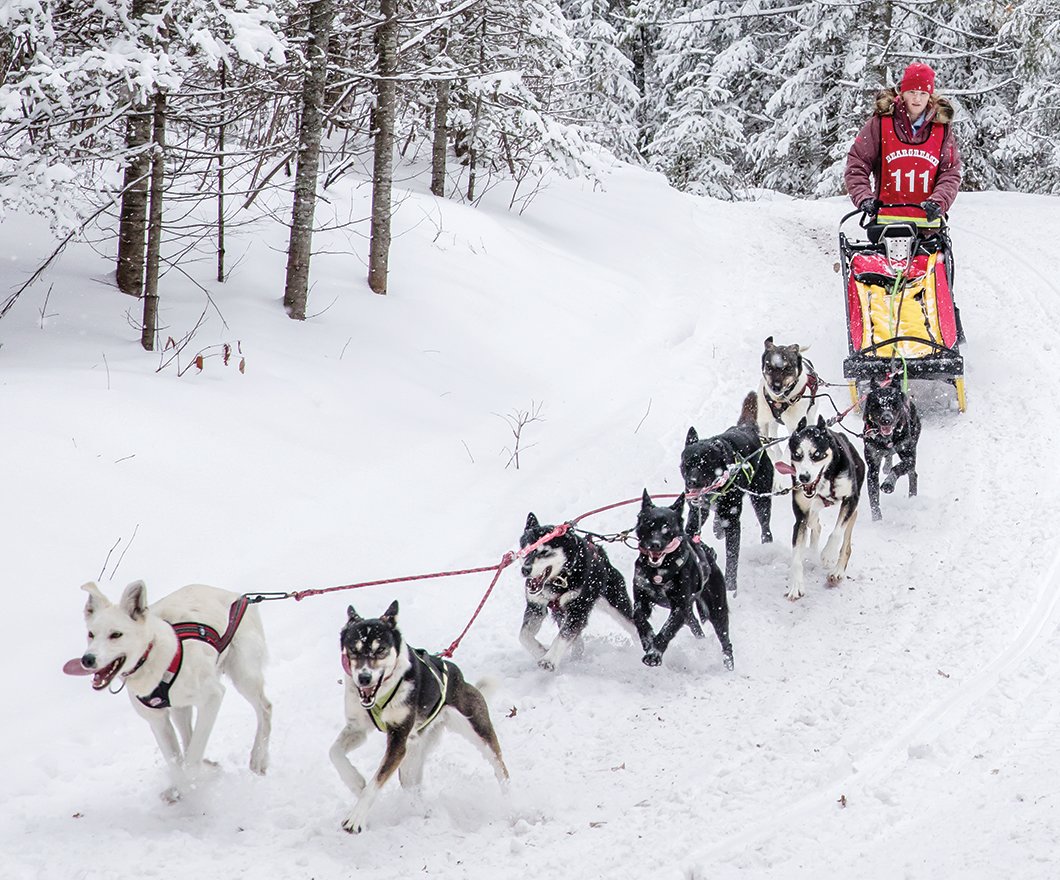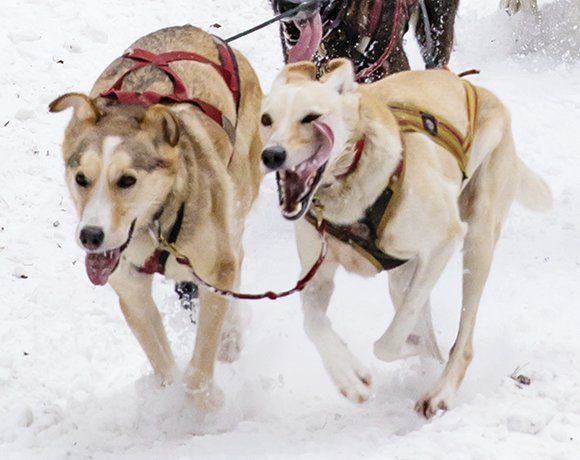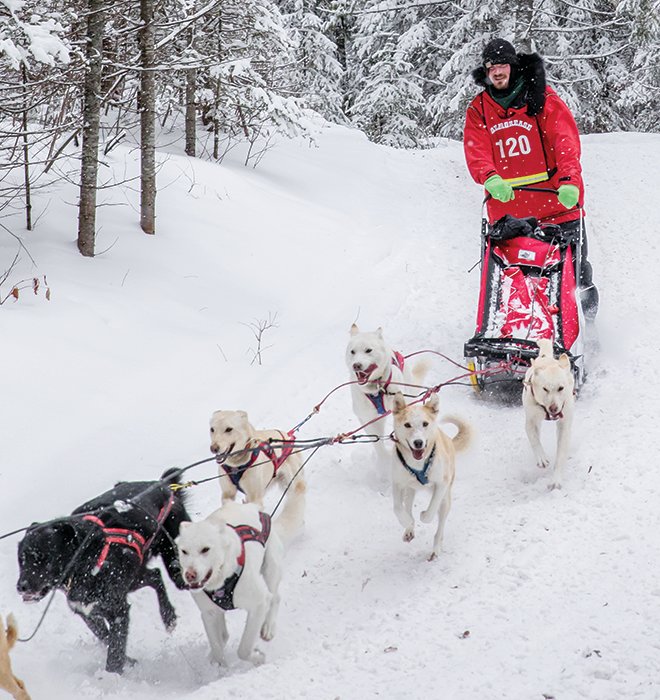Support the Timberjay by making a donation.
For the love of sled dogs
Couple met through mutual bond in training and mushing canines
REGIONAL- Ashley Thaemert and Ryan Miller are both looking forward to hitting the trail on Sunday for Ely’s Wolftrack Classic. The two met through a mutual love of sled dogs, though Miller is …
This item is available in full to subscribers.
Attention subscribers
To continue reading, you will need to either log in to your subscriber account, or purchase a new subscription.
If you are a current print subscriber, you can set up a free website account and connect your subscription to it by clicking here.
If you are a digital subscriber with an active, online-only subscription then you already have an account here. Just reset your password if you've not yet logged in to your account on this new site.
Otherwise, click here to view your options for subscribing.
Please log in to continue |
For the love of sled dogs
Couple met through mutual bond in training and mushing canines
REGIONAL- Ashley Thaemert and Ryan Miller are both looking forward to hitting the trail on Sunday for Ely’s Wolftrack Classic. The two met through a mutual love of sled dogs, though Miller is certainly later to the game.
Mushing might seem very romantic, wearing a fur-trimmed parka and driving a sled through the snowy woods with a team of dogs barking in the lead. But the reality of caring for and training these four-legged athletes is a different story. There is daily care and feeding, veterinary care, yard cleanup, and of course the time needed to establish a bond with each dog, learn each dog’s strengths and weaknesses, and then train the dogs to run as a team.
The story of dedicated mushers almost always starts the same way (unless you were born into a mushing family)… that is, with just a couple of dogs.
“I got my first two dogs in 2016,” said Ryan, a natural resources instructor at Vermilion Community College. Miller moved to northern Minnesota from Idaho in 2016 to work for the U.S. Forest Service in Cook.
“I always really liked working with dogs,” he said. “But I didn’t realize mushing was a thing, and a whole community.”
Ryan was no stranger to training dogs and had scent trained dogs for hunting.
Ryan started mushing with a co-worker, Tom Roach, who used his dog sled teams to bring supplies into the wilderness for forest service winter construction projects.
“I realized you could have sled dogs and didn’t need to do it full time,” he said. “Got two dogs in 2016, a year later I had six.” This year Miller has a kennel of 20 dogs at his home in rural Cook, and he started racing last year.
Ashley has been sled-dogging since she was a teenager in the Twin Cities, also starting out with two dogs. She moved to Colorado after high school and worked for a sled dog touring company before moving back to Minnesota. Her kennel in rural Tower currently is home to 23 dogs, but she was up to 41 dogs last summer. Eight of her dogs are now living in Colorado and giving tourists sled dog rides. Others are now with other kennels nearby. One of her dogs had a litter of nine puppies last summer, and six of those puppies are still with her and in puppy sled-dog training.
Ashley works part-time at the Vermilion Club on Lake Vermilion, “COVID-permitting,” she said, but most of her time is spent working with her dogs.
They both raced in the mid-distance Beargrease race last year, with Ashley coming in 12th, beating Ryan, who came in 14th place, by six minutes.
This year Ryan’s team edged out Ashley’s team by 90 seconds. The two came in 12th and 13th.
“We’d been close for the whole race,” said Ryan, “but during the last leg. I hadn’t seen Ashley all day, but about three hours into the final leg saw someone coming up behind me.”
“Once I saw her coming, I pushed the dogs a little to stay in front. But she did get really close. It was a fun race at the end.”
Ashley’s team had some troubles in the race. Her lead dog, Willy, had a leg injury earlier in the season, and while he had seemed to be fully recovered, she saw he had started to limp early in the race.
“I dropped him at the first checkpoint,” she said. “He was not happy with that.” She moved a two-year old Finka up to lead for the next 60 miles.
“She really stepped up when I needed her to, but I don’t know how much she really loved leading.”
Race conditions for the Beargrease were tough. There was not a deep base on the trail, which meant mushers had to watch out for larger rocks poking up. The lack of deep snow meant it was harder to slow teams down on the downhills. And a pre-race storm left a couple of inches of powdery snow on the trail, which made it harder for the dogs to run as fast as they would like.
The two started training together last year and are hoping to combine their kennels at Ashley’s Tower-area location this summer.
The couple has put close to 1,200 miles on their teams so far this season. They ran the dogs behind ATVs on little-used gravel roads in the fall, and then many more miles were logged in the Boundary Waters once there was snow.
After a tough Beargrease, they are both looking forward to Sunday’s race.
The Beargrease involves a lot of planning and supplies, along with handlers to help at checkpoints. The WolfTrackis mostly just fun, they both said, since it doesn’t involve any overnight stays for them and the related additional logistics. They both had signed up for the longer 8-dog race, but Ashley decided to drop into the shorter 6-dog race while Willy is out recuperating.
The two said they were lucky to have signed up early for the Wolftrack, because all the slots were filled quite early. With so many races canceled this year, and travel out-of-country prohibited, race registrations filled up fast.
The two had been hoping to race in the Gunflint Mail Run race this year, but that was canceled. The Copper Dog, in Michigan, closed to entrants within a few minutes of opening up their registration process, Ashley said.
The lack of races means more time for trips into the Boundary Waters.
“We are hoping to do some more winter camping trips,” they said.
The two expect the WolfTrack to be very competitive this year, with some highly-competitive teams entered this year.
“We are just in it for the fun,” they both said, but they also are looking forward to meeting up with mushing friends at the race.
They will miss some of the race-related activities that have been canceled this year due to the safety rules put in place during the pandemic. The public is not invited to the pre-race vet checks, a popular way for folks to get up close to sled dogs. The public is not allowed at the start or finish lines. And the mushers will not have their traditional meetings and awards banquet.
The dogs, however, probably won’t notice any difference.
“It was more relaxed at the Beargrease this year,” said Ashley. “Less time was spent waiting for things.”
But they both said they will miss seeing people get excited about meeting their dogs. And hopefully by next winter, that will be normal again.
Local Beargrease results
The Beargrease Marathon had a photo finish this year, with Erin Letzring, of Alaska, beating last year’s winner Ryan Redington, also of Alaska, by seven seconds. This was the first time in 23 years a woman won the marathon.
Other area mushers who ran in this year’s Beargrease were Blake and Jennifer Freking, from Finalnd, who came in ffth and eighth, respectively, in the marathon race. John Fisher, of Cook, came in 11th. Alice White of Ely also was in the marathon but didn’t finish.
Erin Schoonweiler, from Irma, Wis., won the Beargrease 120 (mid-distance race). She also won the race in 2020. Nick Vigilante, of Ely, finished fifth, Dusty Klavan, of Togo, finished eighth, Kristen McCarty, of Babbitt, came in 11th, Ryan Miller, of Cook, 12th, Ashley Thaemert, of Tower, 13th, and Kristine Woerheide, of Ely, was 17th.











